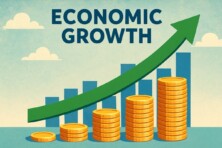The global economy is expected to perform in a “stable yet underwhelming” manner in 2024 and 2025, showing a steady growth rate of 3.2%, according to the IMF forecast.

The International Monetary Fund (IMF) October World Economic Outlook revealed that global economic growth will maintain a steady level of 3.2% during the rest of 2024 and 2025 and keep a similar mediocre performance compared with the pre-pandemic average for the next five years.
The institution downgraded expectations for some of the world’s countries. Thus, India, China, Russia and the United States are forecast to see slower growth between 2024 and 2025.
Meanwhile, Global headline inflation is projected to decline from an average annual rate of 6.7% in 2023 to 5.8% in 2024 and further to 4.3% in 2025. IMF expects advanced economies to reach their inflation targets sooner than emerging markets and developing economies.
Certain issues that developing economies face, such as disruptions to the production and shipping of commodities (especially oil), military and political conflicts, civil unrest, and extreme weather events, have also led to downward revisions to the outlook for the Middle East, Central Asia, and sub-Saharan Africa.
At the same time, forecast upgrades for emerging Asia reflect strong growth fueled by surging demand for semiconductors and electronics, driven by major investments in artificial intelligence (AI). This trend is further supported by substantial public investments in China and India.
Besides, 2025 is forecast to be an improved year for growth in some European countries, like the United Kingdom, Japan and Germany.
As for the risks to the global outlook, they are skewed to the downside due to heightened policy uncertainty. Sudden spikes in financial market volatility could tighten financial conditions, potentially impacting investment and growth, particularly in developing economies. Additional disruptions to the disinflation process, possibly driven by renewed surges in commodity prices amid ongoing geopolitical tensions, could also prevent central banks from easing monetary policy, posing significant challenges to global fiscal policy and financial stability.









